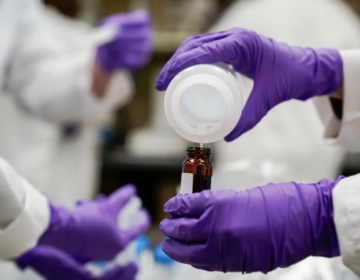Rep. Dean will introduce PFAS bill, the 15th in Congress this year
Both the House and Senate have stepped up efforts to address the toxic chemicals, which affect communities in Bucks and Montgomery counties and nationwide.

U.S. Rep. Madeleine Dean (D-Pa.) (Emily Cohen for WHYY, file)
U.S. Rep. Madeleine Dean plans to introduce legislation next month that will help communities and individuals that have been exposed to a toxic class of chemicals known as PFAS.
For now, details of the legislation are under wraps, but the Democratic congresswoman will disclose the specifics at a roundtable in Upper Dublin next month that will include U.S. Rep. Dan Kildee, D-Mich., co-chair of the Congressional PFAS Task Force, and other members of the House, plus state officials including Pennsylvania Secretary of Health Rachel Levine, Secretary of Environmental Protection Patrick McDonnell, and State Rep. Steve McCarter. Remediation experts, veterans groups, environmental activists, and others have also been invited.
The bill will be the fifteenth PFAS-related measure introduced in Congress this year, as concern grows over a class of chemicals linked to health conditions including high cholesterol, thyroid disease, immunodeficiencies, and some cancers.
Dean has co-sponsored four of those bills. Other elected officials from the area — including U.S. Reps. Brian Fitzpatrick and Brendan Boyle and U.S. Sen. Bob Casey — have co-sponsored PFAS bills, as well. None of the bills has made it out of committee yet, but Dean said there is a growing push in Congress for action at the federal level.
“It’s not only bipartisan, but it’s also bicameral,” she said. “These bills will move and put pressure on Department of Defense and other places where we have this contamination.”
The bills in committee include one that would require the Environmental Protection Agency to designate PFAS as hazardous substances, and another that would provide hospital care and medical services to veterans and their families who were exposed to PFAS at military bases where they lived.
Dean represents most of Montgomery County, including areas near former military air bases in Horsham Township that used PFAS-containing firefighting foam, which leached into groundwater and contaminated drinking-water supplies.
“It’s a huge concern in my district,” she said.
There is currently no federal regulation of PFAS, a group of some 4,700 chemicals known as per- and polyfluoroalkyl substances. Two of the most widely known are PFOA and PFOS, which were used in products ranging from nonstick cookware and pizza boxes to aqueous film forming foam, or AFFF, the firefighting foam used by the military to put out jet-fuel fires.
Earlier this year, the EPA released its PFAS Action Plan, which laid out the agency’s intention to consider setting a drinking-water standard for PFAS and classify the chemicals as hazardous substances. The agency will decide by the end of the year whether to proceed with a drinking-water standard.
Earlier this month at a meeting at Abington High School, a regional EPA director said he expects the agency to have a draft of a hazardous-substances regulation by the end of the summer.
But Dean said the EPA needs to move more quickly.
“They’re not doing enough, and they’re not doing it fast enough,” she said.
To move more quickly, she said, Congress needs to appropriate more money for the agencies to do their jobs.
“We absolutely need robust EPA funding,” Dean said. “And we need robust funding for the Department of Defense for the cleanup. It cannot be something that’s just skimmed off, or maybe we’ll take care of it.”
The military has spent more than $80 million locally on PFAS remediation and studies, including finding alternate water supplies for 15 wells in Horsham and in Warminster and Warrington in Bucks County where PFAS levels exceeded the EPA health advisory of 70 parts per trillion.
But the strong carbon-fluorine bonds that make the chemicals so useful in commercial applications also make them notoriously difficult to get rid of. Often called “forever chemicals,” PFAS do not break down in the environment and continue to infiltrate nearby water supplies. Testing by the military and water company Aqua Pennsylvania has shown continued contamination of Park Creek from the former Willow Grove Naval Air Station and the Horsham Air Guard Station.
“We deserve the right to clean water,” Dean said. “The cleanup of that which is already contaminated, and then moving forward, the knowledge that our water is clean.”
WHYY is your source for fact-based, in-depth journalism and information. As a nonprofit organization, we rely on financial support from readers like you. Please give today.





